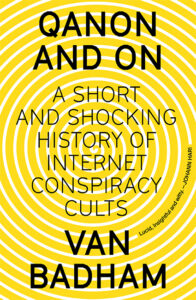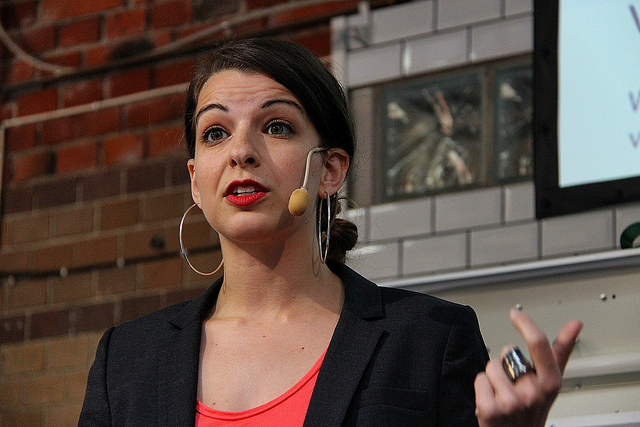QAnon is a far-right conspiracy movement, which revolves around false claims made by anonymous individuals, much of it online.
In this edited excerpt of her new book ‘QAnon and On’ Van Badham details misogyny and gendered hate within this cohort.
Anita Sarkeesian was a graduate student at York University in Canada. Her research critiqued the representation of women in genre tropes across popular culture, and she maintained a website with a YouTube channel, Feminist Frequency, that documented her work.
In June 2012 she launched an online Kickstarter fundraiser to make a series of videos that extended her analysis to video games. ‘I love playing video games but I’m regularly disappointed in the limited and limiting ways women are represented,’ Sarkeesian wrote in her pitch asking for contributions.
To make Tropes vs. Women in Video Games, she needed six thousand dollars to cover production costs.
‘[T]its or back to the kitchen, bitch,’ came one comment.
‘LESBIANS: THE GAME is all this bitch wants,’ came another.
They continued: ‘You are a hypocrite fucking slut’; ‘I’ll donate $50 if you make me a sandwich’; ‘She needs a good dicking, good luck finding it though’; ‘I hope you get cancer :)’; ‘Back to the kitchen, cunt.’
And more. Thousands and thousands more, across all platforms where Sarkeesian had a presence – two thousand within a week on her YouTube channel alone.
A post on Feminist Frequency reported that a ‘coordinated attack’ had mobilised, trying to get Sarkeesian’s accounts banned, sending her torrents of abuse – including rape and death threats – even editing her Wikipedia page to describe her as a ‘cunt’ and transforming her profile picture to porn. On her Tumblr, Sarkeesian identified that ‘a dozen or more different people were working together to vandalize’ the Wikipedia entry alone.
The abuse of Anita Sarkeesian was so intense, it became an international news story.
French website Madmoizelle pegged the blame for the attack squarely on ‘a bunch of 4channers doing everything on the Internet to destroy her’.
It seemed that someone had brought Sarkeesian’s Kickstarter to 4chan’s attention, as they had abuse victim Jessi Slaughter and so many other targets before.
The joke at the time was that 4chan did more to resource a feminist critique of gaming than Sarkeesian could have ever managed on her own. In the wake of publicity about the abuse, donations made in solidarity with Sarkeesian flowed into the Tropes vs. Women in Video Games fundraiser. She had asked for $6000. She received $158,922.
The videos got made but laughs for the woman herself were thin on the ground.
Anita Sarkeesian’s life was transformed: the engaged and eager 28-year-old academic became a woman made famous for her public abuse, because that abuse didn’t stop when she surpassed her fundraising goals, or even when she made her videos. The attention from 4chan had made her into a new kind of internet celebrity: the online feminist folk villain.
Over the next few years, the abuse and death threats continued, and there were ongoing attempts to hack her accounts, shut down her sites and dox her. The attention had made her videos hugely popular, but while she was provided with international platforms in the media and at conferences to discuss her work, she was subjected to bomb and mass shooting threats at public appearances. She was falsely reported to the FBI and IRS for investigation.

In QAnon and On, Van Badham delves headfirst into the QAnon conspiracy theory, unpicking the why, how and who behind this century’s most dangerous and far-fetched internet cult.
She was sent images that depicted video-game characters raping her and had a video game made about her. It was called Beat Up Anita Sarkeesian, and in it the player punches an image of her face until it is misshapen, cut and bloody.
She was also the subject of conspiratorial, crowd-funded amateur documentaries. Two men behind these films, Jordan Owen and Davis Aurini, worked sometimes together, sometimes apart, but shared a mission to prove Sarkeesian was a fraud and manipulator.
Their most infamous project was a crowd-funded documentary called The Sarkeesian Effect.
Aurini self-identified as an ‘intellectual’ and shared propheavy white nationalist opinions on a YouTube channel and on Reddit. He was rumoured to hang out on 4chan’s /pol/ board.
Owen was also a YouTuber, as well as a gamer, and a composer of ‘modern orchestral dance music’. Both men were enraged that Anita Sarkeesian had been recognised for her feminist advocacy at events like the Game Developers Choice Awards and denounced her in The Sarkeesian Effect as ‘a bully like [the video game industry] had never encountered before, a bully that used guilt and political correctness to have her way’.
Their films and public comments repeated the online myth that her stories of harassment were a lie – a pity-eliciting grift to propel her to fame and riches – even as their own projects actively harassed her.
For all the exuberance of their attempts to have Anita ‘cornered’, the only major revelation of Aurini and Owen’s film was that she got her correspondence delivered to a post-office box rather than a street address. An insistence of Aurini’s that she had lied about reporting her harassment to the police turned out to be incorrect.
When the police located her harassment reports, Aurini retorted online that this news merely ‘compounded’ his questions rather than answering them. His reasoning for this was without explanation.
Writer David Futrelle from the anti-misogynist website We Hunted the Mammoth followed the story of the Sarkeesian films and blogged about it. He saw a genuine desperation within these projects for ‘the terrible things people say about Sarkeesian to all be proved true’.
For a start, there was the issue that they were sourcing money from people on a promise to validate the energy ‘half the internet’ had put into hounding her.
There was also, Futrelle observed, a monstrous, sometimes admitted, envy of Sarkeesian among these people. She was able to raise more money from her projects than they could for theirs. She was invited to game industry parties when they were not. Her work was influencing a mainstream conversation.
Futrelle described a pressing, psychological need he saw in Jordan Owen to delegitimise her. Any suggestion that Anita Sarkeesian may not be the creature Owen wanted her to be, wrote Futrelle, ‘actually seemed to plunge him into something close to an existential crisis’.
Around these men, their projects, the online movement against Anita Sarkeesian and forums like 4chan, a new ecology was growing. The internet is the technology that offers the vastest storehouse of humanity’s learned truths in all our history, yet the accessibility of internet communities, their global reach and the rapidity of their communications were creating spaces where participants could affirm and reaffirm wilful myths to any audience that was eager to believe them. Years later, this phenomenon would be called post-truth’.
When it came to the likes of Anita Sarkeesian, the scheming ‘SJW’ villain her antagonists wanted her to be was a far more compelling story than the video-game-playing feminist academic she really was. The same keyboards and screens used to demonise her as an agent of a ‘politically correct’ conspiracy were ones on which a mere few clicks could establish she was not a demon at all. The very proximity to empirical evidence made the deliberate choice to ignore it more conspicuous – and disturbing.
- QAnon and On is out now.
Feature image: Anita Sarkeesian” by theglobalpanorama is licensed under CC BY-SA 2.0
Van Badham is a writer, theatre-maker and novelist, occasional broadcaster, critic, trade unionist and feminist. She writes columns for the Guardian and her interests include gardening, baking and dialectical materialism.





